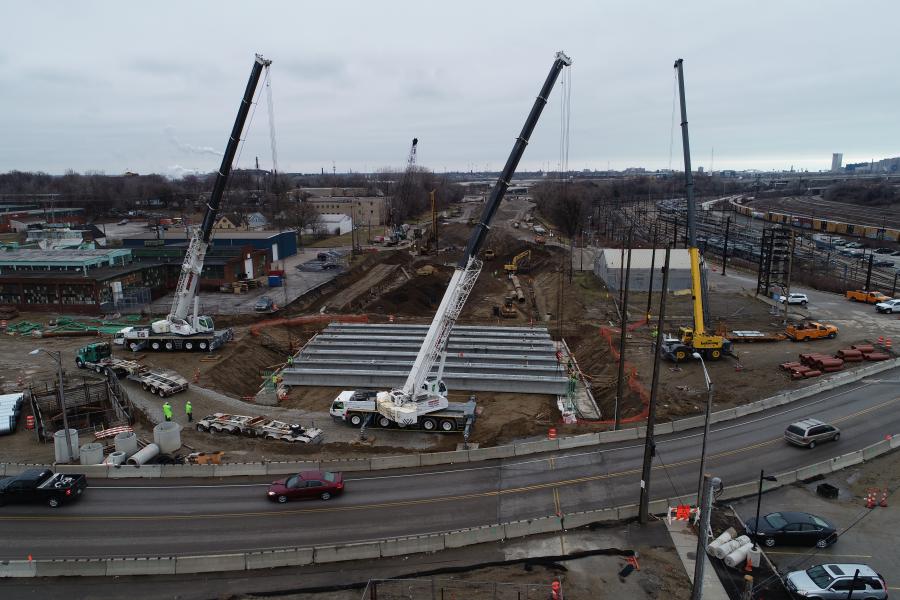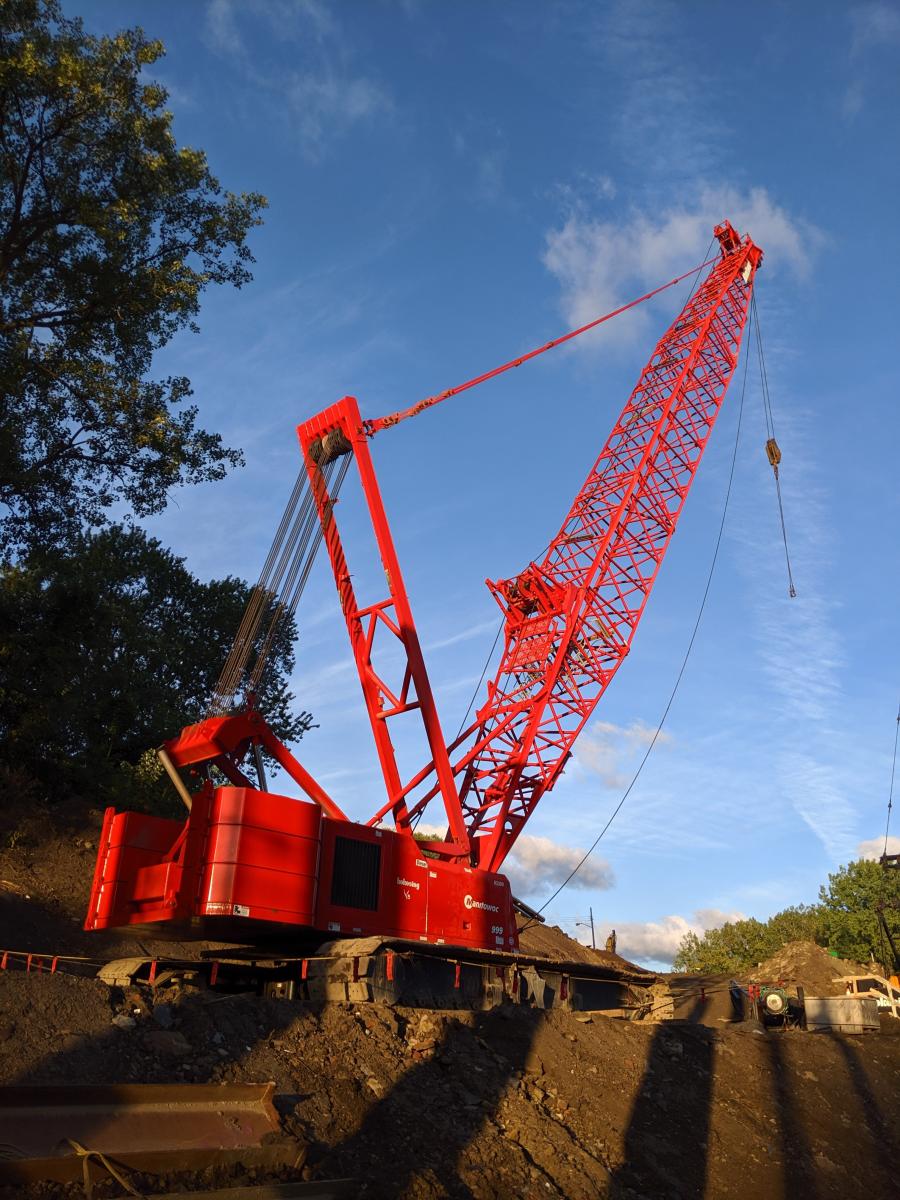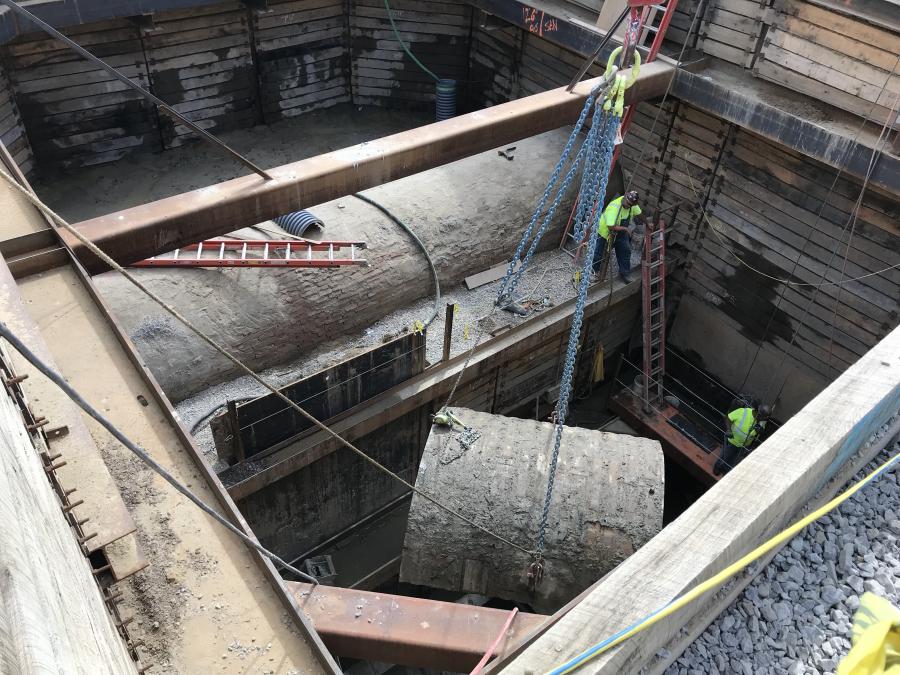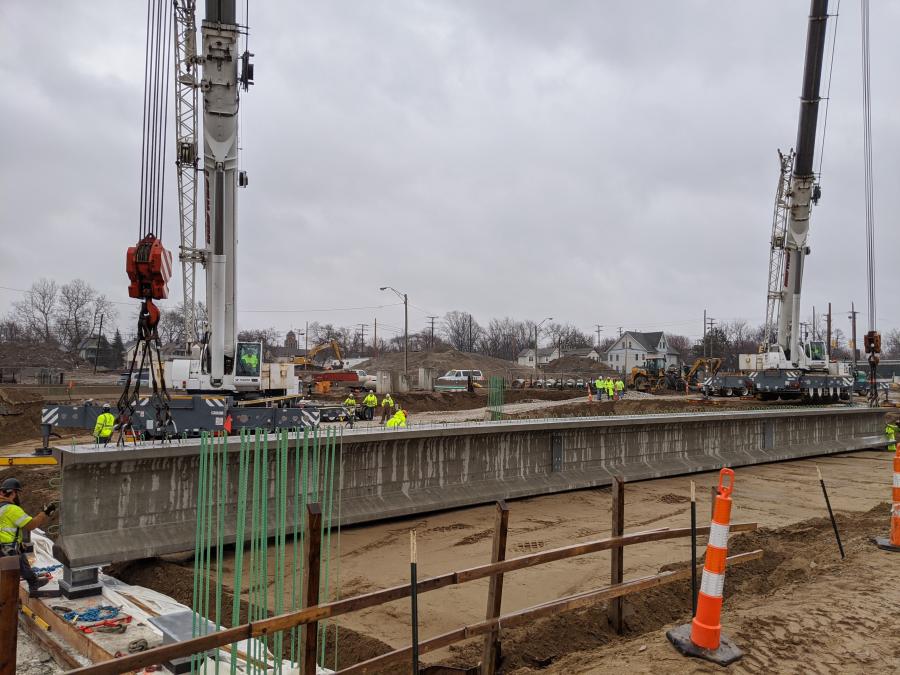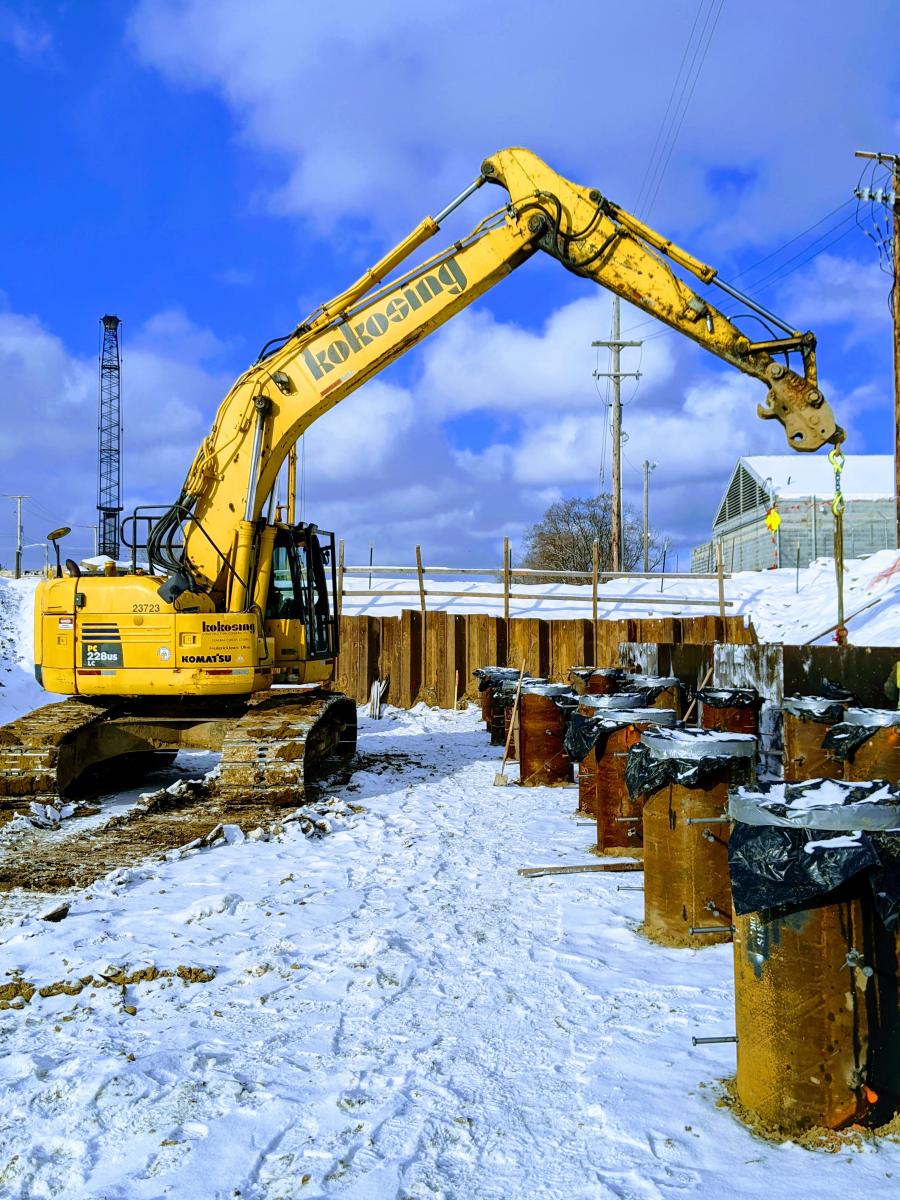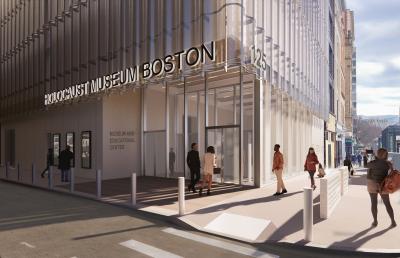In early March 2020, crews set all eight beams for the new East 55th Street bridge over the new boulevard using top down construction. Solider pile lag wall construction for a future retaining wall can be seen in the background. This also is top down construction.
(Ohio Department of Transportation photo)
In Cleveland, Ohio, construction continues on the third and final phase of the $207 million Opportunity Corridor project. The Opportunity Corridor is a planned boulevard that will run from East 55th Street at Interstate 490 to East 105th Street at Chester Avenue.
"The area on Cleveland's southeast side has become known as the ‘Forgotten Triangle', due to the lack of economic activity," said Amanda McFarland, Ohio Department of Transportation (ODOT) public information officer. "Outside of the transportation benefits it could bring to the Cleveland area, this effort opens the potential for new economic development, jobs and a new identity for the community.
"Opportunity Corridor Boulevard will provide improved access to and through the communities of Slavic Village, Central, Kinsman, Buckeye-Shaker and Fairfax, as well as to the main campus of the Cleveland Clinic and the many businesses in University Circle. At the west, and busiest, end of the corridor, it's anticipated it will serve approximately 45,000 vehicles per day."
Construction operations began in summer 2018. Section 3 focuses on building an entirely new road that is approximately 2 mi. and includes four roadway bridges, one railroad bridge, two pedestrian bridges, six signalized intersections, new major storm and sanitary sewers, new water mains, street lighting, landscaping, new sidewalks and a multi-use path.
The Section 3 design-build contract was awarded to Kokosing Construction Company for roughly $151 million. The project has been more than a decade in the making, as ODOT and city officials worked together on plans and reached out to the public for input.
"In the beginning, some residents were upset, as the state needed to purchase properties and relocate residents and businesses in order to accommodate construction of the new boulevard," said McFarland. "Residents are interested to see the economic improvements this project will bring to their neighborhoods. ODOT has received positive feedback regarding the aesthetic treatments incorporated into the E.105th Street Bridge and the extensive tree plantings in the medians and tree lawns of Section 2. Similar bridge treatments and plantings are being incorporated into Section 3."
McFarland noted that drivers in the area are doing their best to cope with the ongoing work.
"There are many local streets that will be temporarily closed, and a few that will be rerouted as part of the project. However, the biggest impact to traffic is the closure of I-490 between I-77 and E. 55th Street. This is a two-year closure that requires all I-490 east and I-77 north and south traffic wanting to access E. 55th Street and E. 55th Street traffic wanting to access I-77 and I-490 to detour.
"We've heard very few complaints from motorists during construction. We began communicating about the I-490 closure six months in advance, did several television and radio interviews, placed hangers on residents' doors and placed billboards in the area to make sure everyone was aware of the closure and detour routes."
According to ODOT project engineer Mark Gabele, the work is progressing well.
"Much of the required utility relocations have been completed, all the required building demolitions are completed and work is under way throughout the OC Boulevard footprint. The project is currently working on several bridges simultaneously, E. 55th Street, E. 59th Street, Greater Cleveland Regional Transit Authority Blue/Green rail lines and Norfolk Southern railroad."
The biggest challenges on Section 3 work include significant excavation and embankment, which are weather-sensitive operations. Also, extensive utility relocations involve coordination with many different owners. Crews working over and under active railways, including GCRTA and Norfolk Southern, requires a great deal of planning and coordination, as well.
COVID-19 also has had an impact on the work. Material deliveries have been delayed and utility companies have reduced staff to complete their required work. In addition, remediating the environmental contamination from the properties that were acquired for the project has been a lengthy and expensive process. Designing and installing new infrastructure around the sometimes century-old infrastructure also has been challenging. The work includes water mains, power conduits, gas lines, communication networks, abandoned gas wells and previously demolished residential and commercial structures.
Currently, Section 3 work is taking place at the intersections of E. 75th Street, Buckeye Road, E. 79th Street, and Woodland Avenue, as well as construction of the boulevard between these intersections. The pedestrian bridges at E. 59th Street and E. 89th Street are under construction, along with sewer and embankment work at the site of the new bridges over Kingsbury Run. Crews continue to make progress at the E. 55th Street bridge and the bridge over the Greater Cleveland Regional Transit Authority (GCRTA) Blue and Green lines.
Most of the required residential demolition for the footprint of Section 3 was completed under the contract for Section 2. The demo work that was completed under Section 3 was primarily commercial structures. Prior to the demolition process, an environmental study was conducted to identify any remediation/removal that was required prior to the demo. Once this remediation was completed, the teardown commenced.
Regarding Section 3 bridge work, there are two vehicular bridges that will be constructed over the corridor: East 55th Street and Norfolk Southern Railroad track bridge. Three bridges will be constructed on the new corridor — two over the Greater Cleveland Regional Transit Authority (GCRTA) Blue and Green lines and one over Kingsbury Run. There are two pedestrian bridges that will be built, including East 59th Street and East 89th Street.
Gabele said the retaining walls are being constructed with a top-down construction approach. This is accomplished by first drilling and pouring the soldier pile support beams prior to excavating the area. This approach minimizes the disturbance of the adjacent properties and shortens the construction duration. This process also allowed the East 55th Street Bridge to be constructed prior to the mass excavation at the intersection of I-490.
According to ODOT project engineer Kevin Kuntz, there was extensive planning and coordination to assure that the soldier pile walls were being constructed at the proper grade.
"A double casing method was utilized on most piles to assure proper beam embedment, concrete placement, prevent groundwater infiltration and assure hole stability. Above the concrete was filled with low strength mortar [LSM] that will be partially removed during the top down timber lagging procedure.
"The lagging will be installed in sections, and dropped in from the top of the piles, riding on the flanges," said Kuntz. "As more material is excavated, the lagging panels will drop until reaching the top of the concrete. A concrete wall facing will be added to the front of the piles held on by shear studs welded to the flange."
On I-490, approximately 450,000 cu. yds. of dirt have been excavated. This has involved mostly sand and silt. As for the excavation of concrete on the closed section of I-490 to accommodate the lowering of I-490/Opportunity Corridor Blvd. (OC Blvd.) to pass under East 55th Street, the concrete removed here was broken with a pavement breaker, crushed, screened and recycled on site to be used on other projects.
Main equipment on the project includes a Manitowoc 180 to construct the bridge substructure; a Manitowoc 2250 to erect structural steel; a Komatsu PC228 excavator for various bridge/wall work; a Komatsu PC450 excavator with a Watson drill for drilled shafts for SPL walls; and a John Deere 450 excavator to construct MSE wall.
Other heavy machinery includes a Cat D5K dozer for rough grading and placing aggregate base; a Cat 12H motor grader for finishing grade subgrade and aggregate base; a Cat 336 excavator to excavate for MSE walls; a Cat 730 articulated haul truck to haul MSE sand from stockpile; a Cat 308 mini-excavator for underdrain; a John Deere 624K wheel loader for underdrain and to load MSE sand; a Vermeer 758 trencher for underdrain; and various asphalt pavers and rollers.
Primary materials required include concrete, asphalt and aggregate. The proposed roadway consists of 12 in. of asphalt on top of an aggregate base. The bridge substructures are constructed with concrete, and the beams are a combination of concrete or steel beams.
Greater than expected regulated wastes have been encountered on the project. These wastes have been tested, classified and disposed of from the project limits. Delays in utility relocations have been mitigated by rephasing the project.
The most time-consuming part of the assignment involves the construction of the Norfolk and Southern Overpass bridge. This is required to be built in three phases, with tracks relocations in each. The track relocations require work and coordination by both the design build team and NS.
The large embankment being constructed in the Kingsbury Run Valley will require stage construction with two settlement periods before the bridge footers can be constructed. This work is weather sensitive and can't be completed during the winter or wet times.
As for construction milestones, the East 55th Street bridge is expected to be completed this summer. Also, the placement of NS tracks onto the new overpass bridge will take place before the end of 2020, which is critical to keeping the project on schedule. Also key is the completion of the reconstruction of the intersections of East 55th Street, Kinsman Road, E 75th Street, E 79th Street, Buckeye Road, and Woodland Avenue with the new OC Boulevard alignment.
McFarland said throughout all sections of construction on the Opportunity Corridor project, ODOT has been committed to diversity and inclusion.
"The contractors on Sections 1 and 2 exceeded their sub-contracting and on-the-job training goals. Kokosing Construction Company has committed 29.8 percent of the total contract value will be work performed by new, small, local and EDGE-certified companies. The project goal is 20 percent.
"Workforce development also is a part of this project, which includes helping those in the community seeking employment by providing them with working with them on finding a career that interests them, applying for jobs, interviewing for jobs and more. These sessions are offered free of charge."
McFarland added that the new roadway will improve access within the area for various modes of transportation, including vehicles, bicycles and pedestrians. The new bridges over the Kingsbury Run Valley and under Norfolk Southern will greatly improve bicycle and pedestrian access to and from the GCRTA train stations at East 55th Street and E79th Street.
The new boulevard is expected to be substantially opened to traffic in fall 2021. All work is expected to be finished by summer 2022.
David Short, ODOT design project manager, said it's satisfying to see the project inching closer to completion.
"It's extremely rewarding to have the construction of the first two phases of the corridor completed. As construction proceeds on the final phase, everyone is excited to see how the completion of the entire corridor brings much needed transformation to the adjoining neighborhoods." CEG
Cindy Riley
Birmingham, Ala., native Cindy RIley originally planned on a career in law, but during her sophomore year in college realized journalism was her true calling. A magna cum laude graduate of Samford University, Riley first worked in radio and TV. Named Best News Anchor, Best News Reporter and Best Investigative Reporter by the Associated Press, she interviewed numerous personalities, ranging from Dr. Henry Kissinger and President Bush to Michael Jordan and Captain Kangaroo.
As a print journalist, Riley has covered a variety of topics, including construction, business, health and the arts. In addition to CEG, her work has appeared in special reports for USA Today and the L.A. Times. Other publications have included New South Magazine, Portico, Thicket, Alabama Heritage, B-Metro, Business First and Birmingham Business Journal.
Read more from Cindy Riley here.
Today's top stories



